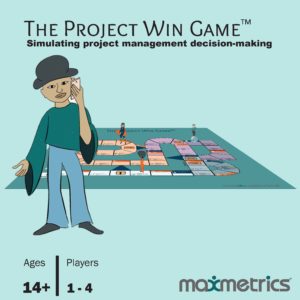
In December 2021, we announced our new game: The Project Win Game™. It is designed to simulate the lived experience in making the decision between agile and traditional/waterfall methodologies while working on a project. It is a serious game.
What is a serious game?
Most games have in common that you have to follow rules, achieve a goal, interact, and have good sportsmanship. In recent years, game-based learning has shown that it is possible to also learn by playing, which has been implemented in schools, universities, and large companies.
Apparently, putting together the words “serious” and “games” might seem contradictory. Engström and Backlund (2021) define ‘serious games’ in their paper Serious games design knowledge – Experiences from a decade (+) of serious games development as “games that engage the user and contribute to the achievement of a defined purpose other than pure entertainment (whether or not the user is consciously aware of it)” (pg 1).
Consequently, serious games are those whose main objective is not fun or entertainment, but rather learning or practicing skills. In sectors such as education, aeronautics, science or health serious games have been used widely. The purpose can be from simulating a flight for pilots to training firefighters in emergency situations or training surgeons for surgical operations.
Although there are different formats (board games, technological games, virtual reality games), most game-based learning systems usually include three characteristics: gamification, simulation, and learning.
Gamification
A fundamental element of any serious game is the game dynamics, which include rankings, rewards or point systems. This gamification encourages and motivates players: we all like to get more points, coins, lives or go to the next level.
Simulation
Serious games often reproduce, imitate or simulate real life situations. Through the recreation of environments, the players are immersed in a similar situation to the one they would find beyond the game board or screen. This recreation allows players to interact in this simulated reality as well as to practice the skills acquired during the game.
Learning
To teach something is the main purpose of serious games. Not all games are serious games. Serious games must have a purpose that is not playful and that will be related to educational or training aspects improving knowledge transfer.
The Project Win Game™
Taking into account all these requirements, developing a serious game is not an easy task: it takes a lot of work, time, creativity, talent and money. The Project Win Game™ is our attempt to help project managers, agile coaches, and project team members really experience the impacts of their decisions on a project while having fun. It is a serious game.